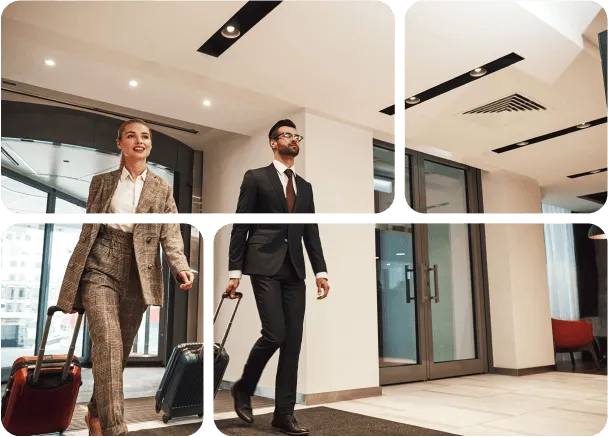At mindit Forward: Data & AI Transformation Lift Off, we were honored to host Matthieu Chevrier, Chief Digital Officer at Gekko Group, part of Accor. Matthieu walked us through how Gekko scales digital hospitality with speed, data, and a product mindset that keeps the traveler experience front and center. From a first booking in 2010 to more than 1 billion euro in hotel transaction volume, Gekko’s story is about owning the tech stack, learning fast, and partnering where it matters.
“I am not a salesperson. I am an IT person. But I want you to understand what we do.”
“We own 100 percent of our technology, and it became a strength.”
Who Gekko is and what it operates
Founded in 2009 and acquired by Accor, Gekko remains an autonomous digital business inside the group, with its own strategy and engineering teams. It distributes more than two million properties across hotels and alternate accommodation, serving both corporate travel and leisure. That dual focus is rare in hospitality and shapes the platform decisions Gekko makes every day.
Gekko buys inventory from hotel chains and independents, from wholesalers and B2C sources, and from global distribution systems such as Amadeus, Sabre, and Galileo. It then sells through APIs and B2B portals, creating a single, simplified feed for customers that hides the multi-sourcing complexity behind the scenes.

What this means for customers: a consistent search and booking experience that draws on the widest pool of supply without forcing users to care where that supply came from.
Scaling with data, speed, and a product mindset
Matthieu’s operating model is simple and disciplined. Aggregate widely. Normalize relentlessly. Ship value where customers feel it. That is how you turn millions of rate and content variations into a reliable experience for booking teams and travelers.
Two details stand out:
- End-to-end ownership of the core platform creates room for faster iteration and competitive advantage.
- Serve both corporate and leisure without fragmenting the codebase or the roadmap.
“We cover both leisure and corporate. Not so many hospitality companies do both.”
Gekko’s AI strategy in three layers
Gekko treats AI as a portfolio, not a single feature. Matthieu breaks it down into three layers.
- AI for customers
Customer-facing use cases that are visible and valuable. Examples include an AI travel itinerary assistant and support automation. Gekko is also preparing to distribute corporate hotel content directly into customer AI systems using protocols such as MCP, so large clients can query their own GPT-like agents and receive Gekko results natively. - AI for hotels and suppliers
Automation that improves data freshness, content quality, and operating speed. This is mostly invisible to travelers, yet it is critical for accuracy and trust. - AI for Gekko staff
Gekko GPT is the plan for an internal, safe environment where employees can leverage company data and AI responsibly. The goal is to educate the entire organization while protecting privacy and compliance.
“It is very important to have a safe environment where you control the data.”

The takeaway: start from clear outcomes. Put governance and observability in place. Teach the whole company to use AI within a controlled perimeter, then scale what works.
Buy or build: a pragmatic and hybrid stance
Matthieu’s most quoted slide asked a classic question: should you buy or should you make. His answer avoids dogma and favors pragmatism.
- Build when the feature touches the core business and can become a competitive advantage.
- Buy when the capability is not core, is ready to use, and the economics make sense.
- Remember the full picture: build cost and time, run cost, compliance and data location, in-house knowledge, flexibility, and real competitive edge.
The Wizard project with mindit.io: productizing an AI itinerary
One example of building for advantage is the AI travel itinerary wizard developed together with mindit.io. Gekko chose to make this product because it touches the customer experience directly and aligns with core strategy.
The wizard collects a Customer 360 context in a five-step flow: destinations, trip dates, party details, accommodation preferences, and a unique interest profile using sliders that map to a dynamic keyword cloud. The agent then generates a day-by-day plan and enriches it by orchestrating third-party services for geocoding, maps, and place content. It connects to Teldar, Gekko’s B2B distribution, so that a suggested plan is never a dead end. You can regenerate parts of the plan, give the agent guidance, or use an I am feeling lucky option for rapid alternatives.
Under the hood, the team used agentic interactions, LLMs, advanced prompting, and tool use to call external APIs. On the interface side, the wizard ships as custom web components, which means it can be embedded across Angular, React, Vue, plain HTML, and even mobile web views. That design choice lowers total cost of ownership and allows upgrades via npm or CDN without rewriting host apps.
“For this project we chose to make with mindit.io. We considered it a competitive edge and part of our direct strategy.”
Trust, compliance, and the Accor context
Even as a nimble unit, Gekko operates within the standards of a global hospitality group. That raises the bar for security, GDPR, and data location. Building certain components in-house increases control and transparency. Buying from major software providers can also work, but only when pricing and assurance align with enterprise reality.
The principle: keep core data paths explainable, auditable, and ready for executive scrutiny. You cannot create confidence at the end of a project. You design for it at the beginning.

Partnership as a multiplier
Throughout the talk, Matthieu linked Gekko’s progress to empathy, curiosity, and collaboration. That ethos matches mindit.io’s own journey. The itinerary wizard is one example where a shared product mindset turned a concept into a reusable asset that can live across channels and evolve quickly.
What strong partnerships create: faster learning cycles, safer delivery in regulated contexts, and a common language that connects business intent with engineering decisions.
Lessons hospitality and travel leaders can use now
- Own your core so you can move faster where it matters. Buy the rest when time-to-value and economics are better.
- Teach the whole company to use AI safely. An internal GPT with company data turns AI from a side project into a habit.
- Design for reuse. Ship capabilities as components that can run across stacks and channels.
- Aggregate supply, simplify the feed, and hide the plumbing behind a consistent API and UI.
- Attach AI to outcomes, not demos. If travelers and booking teams do not feel the difference, keep iterating.
How mindit.io can help

We partner with retailers and operators to build modern data foundations that harmonize sources and unlock personalization, modernize applications from monoliths to modular, observable ecosystems, and enable AI responsibly with governance, privacy, and measurable outcomes front and center.
Watch and explore
- Full talk by Matthieu Chevrier, CDO, Gekko Group.
- mindit Forward recap hub with all sessions and articles.
Ready to explore your roadmap
If you are building the next generation of travel and hospitality products, we can help you assess the buy-versus-build split, set up a safe internal AI environment, and ship reusable front ends that lower cost while increasing speed.
Next steps
- Book a 30-minute call with our architects
- Follow us on LinkedIn to stay updated with the latest news from mindit.io
- Connect with us to explore partner integrations for your data and AI journey








































